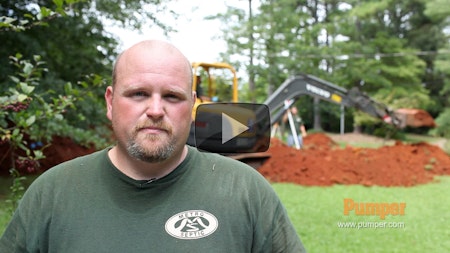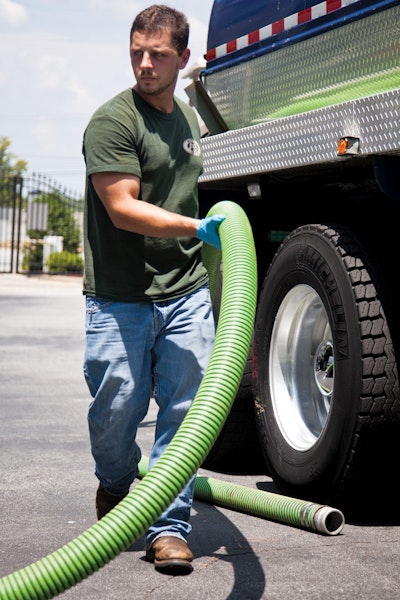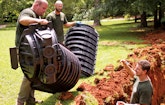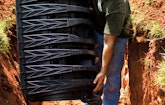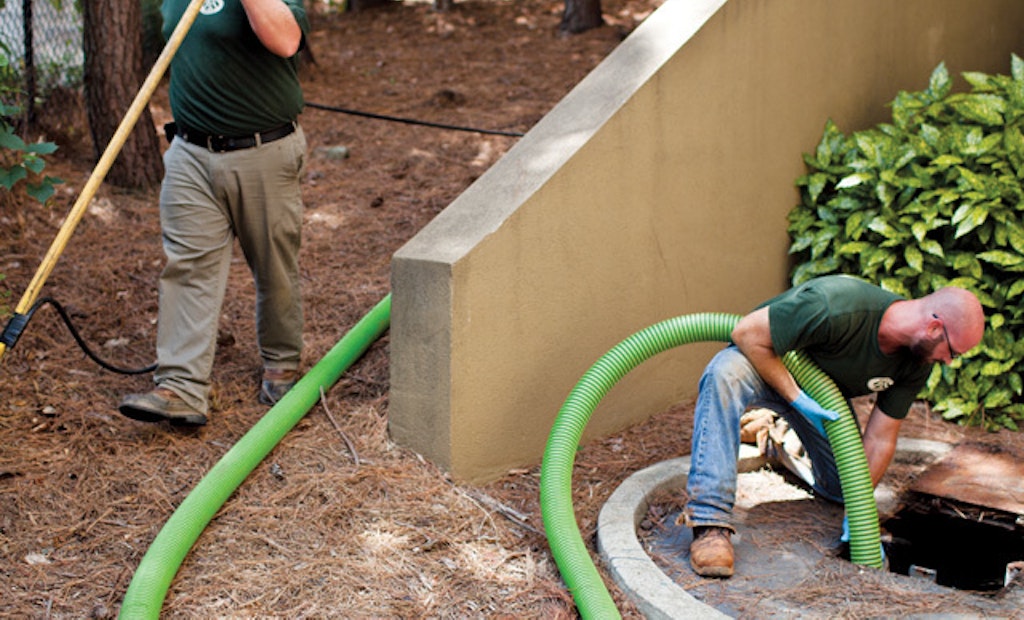
Interested in Onsite Systems?
Get Onsite Systems articles, news and videos right in your inbox! Sign up now.
Onsite Systems + Get AlertsSix years ago, Kenney Lee decided to leave his job pumping septic tanks to start his own company. His employer, a plumbing company with a septic division, was OK with that and even sent work his way until they decided to get out of the pumping business all together. Lee ended up with their trucks, their customers, and a few too many headaches.
He’s in a more comfortable place now, and is looking to grow again by perhaps finding ways to treat waste to help reduce the increasing cost of disposal. But this time, he plans to grow more carefully.
Lee and his wife, Marsha, started Metro Septic in Cartersville, Ga., in 2005 to serve the metro area of Atlanta. It wasn’t the first time he ran his own business. He and a younger brother had a landscaping company for a couple of years after high school. It didn’t work out too well, and that’s how he ended up doing septic pumping, thanks in part to his older brother’s reputation as an honest and hard-working employee.
“My older brother was working there and had a good work ethic so they wanted to bring me in, even though I didn’t know anything about plumbing,” Lee says. The company’s approach to hiring was an important lesson for him: You can train anyone to do a job; you can’t teach them to be honest and ethical.
TOO BIG TOO FAST
Lee started working for his former employer in 1999. It was a great relationship while he worked there, and still is. They supported his decision to go out on his own, even sending him overflow work of up to 10 calls a week during the busy season. He started Metro Septic with one older vacuum truck. “I scrapped and scraped and bought that truck, and everyday I wondered if I was going to make it home, but that’s all I could afford.”
After about three years, he had finally saved enough to buy a new service vehicle. As luck would have it, it was just a few months later that his old bosses decided to close their septic division. “We got together and I took over their septic work, bought two of their trucks and started taking all of their septic calls,” he says.
“I was getting tons of calls and didn’t really know what to do with it all. I was used to three or four jobs a week and all of a sudden I was getting six to 10 calls a day. I went from just making a paycheck for myself to having to pay for trucks and worrying about providing for three employees and their families.”
What seemed to be a win-win situation ended up in chaos. “I found it hard to stay on top of everything, quality control was a problem. I still haven’t figured out how big companies handle it. I wasn’t sleeping well at night. I knew the direction I wanted to go, but it was just wild for a couple of years.”
FINDING EQUALIBRIUM
He became worried about the reputation he was creating for Metro Septic, such as having to take calls while dealing with a customer at a jobsite. “That goes against everything I want to do, that’s the wrong way to treat somebody.”
He’d had enough of the upheaval after two years and decided he needed to do something to correct the situation. So he sold two of his vacuum trucks and downsized Metro Septic to start over and do it right.
That included applying the lesson learned from his former bosses. He brought his good friend Casey Bohn onboard and taught him the business. “He used to work in a carpet mill; he didn’t know anything about septic systems. You can teach someone how to drive the truck and run an excavator, you cannot teach them how to treat people, and I get calls all the time about how much people like him.”
Now it’s just he and Bohn serving customers with its small fleet of equipment. They are down to two vacuum trucks with jetters, a 1999 Peterbilt 379 from House of Imports Inc. in Miami with a 3,600-gallon steel tank and National Vacuum Equipment Inc. pump, and a 2000 International 4700 with a 2,500-gallon steel tank from Transway Systems Inc. Metro Septic also has two Takeuchi TBO16 mini excavators.
Lee’s wife handles the books and his dad, John, helps run the office, maintain the website and takes care of some of the business matters Lee is too busy to get to, including handling some customer phone calls. His father also helps out with business advice, having owned a couple of companies of his own.
“I knew how to go out and talk to customers and do the work, but when I started Metro Septic I had to do office work, too,” Lee says. “It was kind of a shock to my system. I’ve gotten better, but that’s where my dad comes in. He’s an entrepreneur, so I’m very lucky to have him to help me out.”
Lee is comfortable with his business now, and he knows his customers are being treated right. It was another lesson his former employer taught him about life and business: Be fair and act with integrity. “There are some pumpers who will quote a low price over the phone, so low that between fuel and dumping fees, they would lose $50 on every call. So once they get out there, they nickel and dime customers to death to get to a profitable price,” Lee says. “When customers ask me how much it’s going to be, I tell them, and that’s how much it’s going to be when I get out there.”
That results in losing some jobs, but it’s better than unpleasant and perhaps unaffordable surprises for valued customers.
SMART GROWTH
Lee is now looking at a future of growth he can control so he doesn’t get in over his head again. “There’s a fine line between staying in a realm I can handle and getting too big for my britches.”
He and Bohn do about six to 10 jobs a day during the busy season and maybe two or three the rest of the year. “What I want to do is eventually start processing grease and septic myself,” Lee says. He hopes processing the waste will help offset the rising cost of disposing of septic and grease trap waste. What used to cost $25 per load now costs from $300 to $400.
“I’ve been doing a lot of research the last couple of years. I’ve talked to several companies that are doing it and traveled to Texas to visit a company that turns waste into fertilizer. Some companies are pulling out the oils and reselling that. I’m trying to figure out the cheapest, easiest, and best way to get my foot in the door and then build on it.”
He sees that as his growth area, but has some capacity for more septic and grease trap pumping. He’s increasing marketing efforts rather than depending on word-of-mouth, which he says accounts for about 90 percent of his business. He’s OK being a small company, but his uniforms and trucks are clean and well maintained to present a professional image. Since he can’t afford billboards and expensive ad campaigns, he’s depending on name recognition and his website.
“We send out flyers, we talk to customers’ neighbors when we’re out on a job, and we give out handfuls of business cards,” he says. And he continues to protect his image, his most valuable asset.
“A lot of the largest plumbing companies in the metro area refer work to us,” he says. “They know we’ll take care of their customers and that we’re going to be honest.” That includes his former employer, of course. “We still work together a lot. They trained me as a plumber and I know how to do plumbing, but I give that business back to them now.”
After all, he contends, that’s the fair and ethical thing to do.
